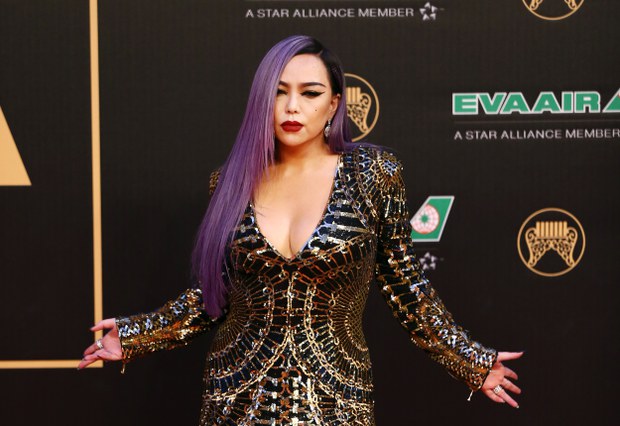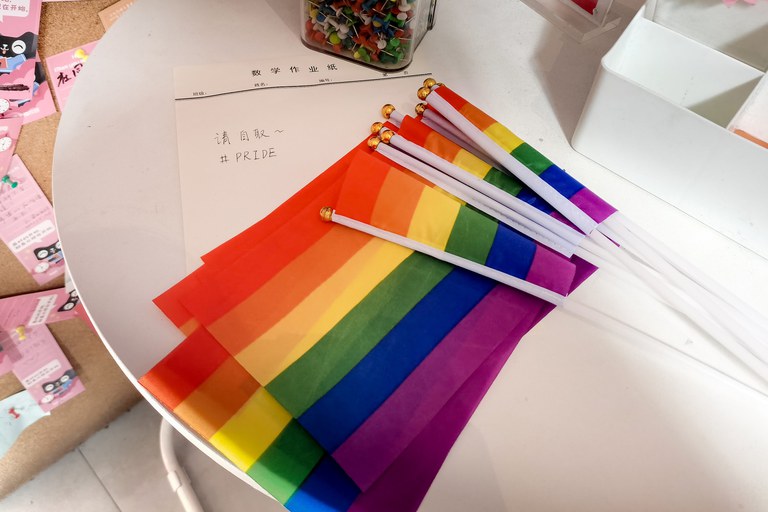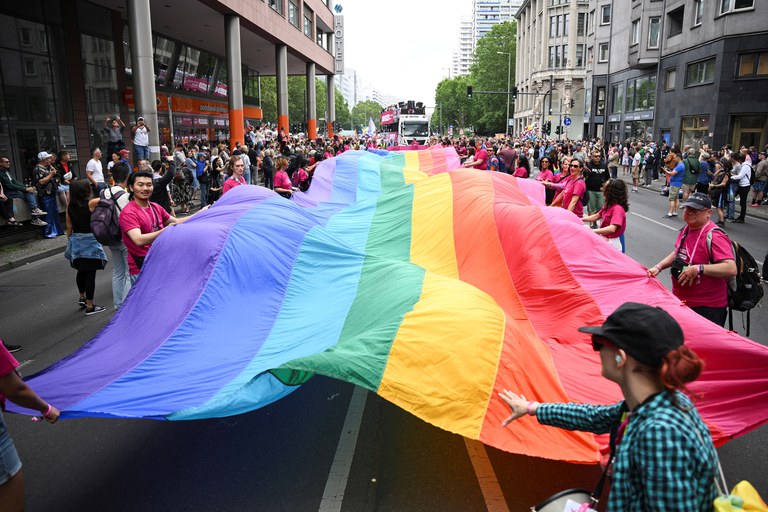Rainbow symbols, LGBTQ+ anthem banned from Taiwan singer A-Mei’s Beijing gig
Share

Singer A-Mei arrives at the 27th Golden Melody Awards in Taipei, June 25, 2016.
Chinese officials removed a LGBTQ+ anthem titled “Rainbow” by Taiwanese pop star A-Mei from her setlist from a recent concert in Beijing, while security guards forced fans turning up for the gig to remove clothing and other paraphernalia bearing the rainbow symbol before going in, according to media reports.
Sherry Zhang, who goes by the stage name A-Mei, wrote the song for all of her LGBTQ+ friends, and it is frequently heard at Pride events on the democratic island of Taiwan.
Her fans among the LGBTQ+ community often turn up and wave rainbow flags or wear rainbow clothing in a show of solidarity, confident that the song will make an appearance.
But fans who went to A-Mei’s concerts at Beijing’s Cadillac center at the weekend took to social media to complain of being targeted for censorship by the authorities instead.
Security guards made them change out of their rainbow clothing and wear plain black clothes provided by the venue, while even bags with rainbow ribbons were prevented from entering the venue, they said.
“When I watched A-Mei, it was at Beijing Workers’ Sports Complex in 2015. Back then we could still pass around a gigantic rainbow flag,” a user on Xiaohongshu, China’s version of Instagram, wrote in comments cited by Time.
“Now the security guard is really carefully checking all the rainbow elements. What exactly are you afraid of?”
The rainbow flag, or the Pride flag, is used around the world as a symbol of lesbian, gay, bisexual, transgender and queer communities.
Champion of diversity
The Asia One news site reported last month that security guards at an A-Mei gig in Singapore had prevented fans from waving rainbow flags during the singer’s performance of the song, which was allowed to form part of the show.
An LGBTQ+ community member who gave only the nickname Bingbing for fear of reprisals said A-Mei is seen as something of a gay icon for her championing of sexual diversity.
“A lot of people were asked to change out of rainbow clothing or remove rainbow logos at Sherry Zhang’s Beijing concert,” Bingbing said. “The Chinese government publicly asked people to cover up the rainbow symbol, which is the symbol of equal rights.”
“I personally think that sends a very strong signal.”


In April, two LGBTQ+ students from Beijing’s Tsinghua University lodged an administrative lawsuit against China’s Ministry of Education after being harassed and threatened by the authorities for leaving rainbow flags out for people to take in a campus supermarket.
While homosexuality was decriminalized in China in 1997, and removed from official psychiatric diagnostic manuals in 2001, ruling Chinese Communist Party leader Xi Jinping has ushered in a far more conservative attitude to sexuality than his predecessors.
Activists have said the crackdown stems in part from the government’s fear of civil organizations as a threat to party rule.
“The black hand of the Chinese government is reaching into all aspects of society,” Bingbing said. “The contempt for and policing of gay symbols is strong proof of that.”
Contrast with Taiwan
In July 2021, the Chinese social media platform WeChat deleted dozens of accounts belonging to LGBTQ+ groups at universities, saying they had broken laws and regulations governing online content.
The move came after the cancellation of Shanghai’s decade-old Pride event in 2020. The organizers, ShanghaiPRIDE, which had also been involved in ongoing civil society activities in support of the LGBTQ community in China, including running seminars for the parents of LGBTQ people.
In democratic Taiwan, which legalized same-sex marriages in 2019, the picture is very different,
“Taiwan is a society that supports diversity,” Bingbing said. “Same-sex marriage was legalized a few years ago, making Taiwan the first country in Asia to legalize it.”
“Last year, it also passed a law on cross-border same-sex marriage. All these things are a manifestation of social progress.”


A Chinese gay man living in Europe who gave only the name Antony said the LGBTQ+ community is seen as politically “sensitive” by Beijing.
“Taiwan is far ahead of China – they have legalized gay marriage – while China is suppressing sexual minorities in various ways,” he said.
“Last month, Berlin had its Pride parade, and more than 500,000 people took to the streets to support the rights of sexual minorities,” Antony said. “Even Germany’s parliamentary speaker and interior minister took part.”
‘Banning the rainbow’
As a gay man, I looked at the rainbow flags flying everywhere and thought back to when I was in China and I was afraid to even admit my sexuality,” he said, citing the closure of the Beijing LGBT Center in May.
“It is no surprise that the Chinese Communist Party is banning the rainbow,” Antony said. “Some Chinese sexual minority rights organizations have also been forced to close down.”
“In the eyes of the Chinese government, we are seen as a sensitive and unstable group,” he said. “Organized groups … have held various activities and campaigned for the affirmation of our rights, alongside a civic struggle for freedom of speech and association.”
“That’s why they’re being suppressed by the Chinese Communist Party.”
More and more highly educated urban Chinese have begun coming out in recent years, and while some find acceptance among their peers, social attitudes still strongly favor heterosexual marriage and children.
How many Chinese identify as LGBTQ+ is unknown. The country’s health and family planning ministry has estimated that there are between five and 10 million gay men in China, but activists say the actual number is far higher.
There have been a growing number of anti-discrimination lawsuits filed by the community in China since around 2010, as well as some rare though unsuccessful bids to register same-sex marriages.
Translated by Luisetta Mudie.







